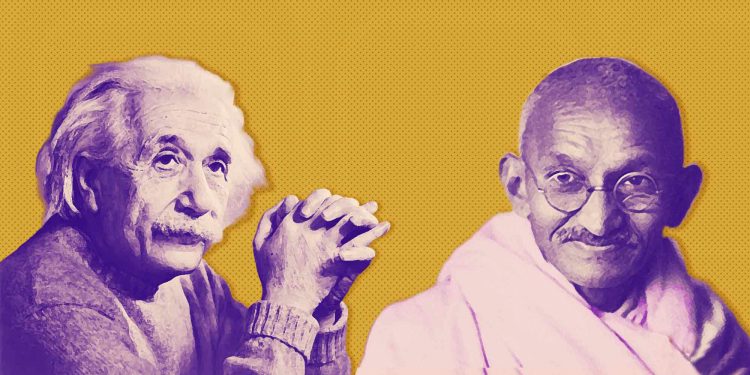While replying a question on atom bomb in 1952, Einstein had declared, “I have been a pacifist all my life and regard Gandhi as the only truly great political figure of our age”. Wall of his study at his home adorned four portraits. These portraits included three great scientists, Faraday, Maxwell and Newton. The fourth portrait was that of the unique statesman; Mohandas Karamchand Gandhi.
In the eyes of Einstein, Gandhi represented that higher concept of human relations in political sphere that we must aspire with all our powers. One’s own self is the most stubborn thing that often rejects changes. Those who accomplish the stupendous task of changing themselves usually become catalysts of changes in this world. Einstein and Gandhi are stark examples of rare humans who metamorphosed their lacklustre boyhood into illustrious identities. Gandhi experimented with truth while Einstein experimented with expansion of thought to limitless horizon of science. Both of them shook up the very base of the field they worked in, be it politics or physics.
Gandhi, the messiah of non-violence, was a pacifist of strange mettle. He was full of vigour and dynamic energy. He never submitted himself to fate or anything that he considered evil. So was Einstein. For the Zionist cause or against the wrongful use of nuclear energy, he exhibited his pacifism with strong fervor.
The Mahatma dreamt of a free and strong India that may offer itself as a willing and pure sacrifice for betterment of the world. While supporting the demand for homeland for Jews, Einstein stressed that he would not get associated with the movement unless it tried to make peace with the Arabs as well as the world. Yet both of them never got themselves detached from their roots to which they clung tenaciously.
Einstein had declared, “The antithesis is not between Jews and Germans but between honesty and lack of character. He who remains true to his origin, race and tradition will also remain loyal to the state to which he is a subject”. Mahatma’s principle echoed the same sentiments who said, “I want the culture of all lands to be blown about my house as free as possible. But I refuse to be blown off my feet by any; I refuse to live in other people’s houses as an interloper, a beggar or a slave”.
In 1952, following death of Chaim Weizmann, the first President of Israel, Einstein was offered to become the President of Israel. Einstein had politely but firmly rejected the offer. While whole India was busy preparing for Independence Day celebrations August 14, 1947, Gandhi, the uncrowned emperor of Indian hearts was sulking in Hyderi house on Belaghata road of Calcutta, the city engulfed by communal violence. This architect of Indian independence had kept himself detached from corridors of power of free India.
Gandhi was essentially a man of religion. He claimed to be a Hindu to the inner most depth of his being. Yet his concept of religion had nothing to do with dogmas, customs or rituals. Elaborating his belief in October 1929 issue of ‘Young India’, he had written, “There is an indefinable, mysterious power that pervades everything. I feel it though I do not see it. It is this unseen power which makes itself felt and defies all proof because it is so unlike all that I perceive through my senses.” When the argument on quantum mechanics was at its peak, Einstein had stressed his belief, “Everything is determined, the beginning as well as the end by forces over which we have no control. It is determined for the insect as well as for the star. Human beings, vegetables, or cosmic dust, we all dance to a mysterious tune, in toned in distance by an invisible piper.”
In an article in the ‘New York Times’ magazine, Einstein had described three states of religious development. Religion of fear moved the primitive people. In due course of time it became moral religion, whose driving force was social feelings. “This in turn could become the cosmic religious sense, which recognises neither dogma nor God made in man’s image. I assert that cosmic religious experience is the strongest and noblest driving force behind scientific research”, Einstein had reiterated. On March 11, 1939 Gandhi had defined God in the ‘Harijan’ by saying, “I recognise no God except the God that is to be found in the hearts of dumb millions. They do not recognize His Presence; I do. And I worship the God that is truth or truth which is God, through the service of these millions”.
Both these great souls were disturbed by abuse of scientific progress. Einstein inveighed against it as it enabled men to mutilate one another in war and during peace it enslaved man to machines. Concern for man himself must always constitute the chief objective of all technological progress. Gandhi did not reject machinery. He objected the human slavery to machinery, and the machineries that were used to concentrate wealth in a few hands causing social imbalance.
For his American citizenship, President Roosevelt had suggested Einstein to accept offer of some Congressmen to get a special Bill passed on his behalf. Einstein had declined the offer of American President and had decided to go through the normal procedure for American citizenship. He had to travel to Bermuda and stay there for few days to satisfy the formalities. The Royal Governor at Hamilton had arranged Island’s best hotels for this illustrious scientist. But for Einstein these hotels were stuffy and pretentious. He chose to stay in a modest guest cottage at Bermuda. He had declined all official invitations from Bermuda gentry and managed with the hospitality of a German cook.
In last stage of his life Einstein had suffered intense pain. On April 14, 1955 Dr. Dean diagnosed a small leakage of blood from a hardened abdominal aorta as the reason. With much difficulty, he was persuaded to visit the hospital. After arrival at the hospital he had started to feel better. He telephoned his mercer street residence for his spectacles, pencil and paper. He departed from this mortal world on April 18, 1955. Yet he felt, if there was still time left it should not be wasted.
Sudhir Kumar Raut






































